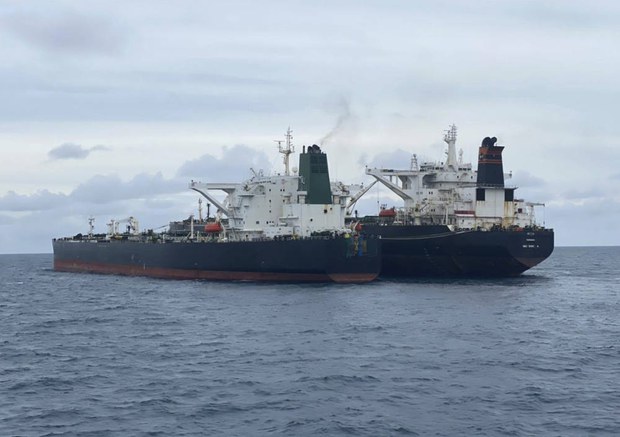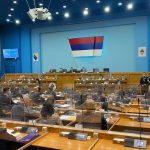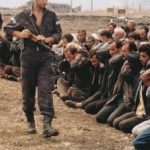To avoid sanctions and enlarge ability to finance terrorist, proxies’ activity and WMD development programs Iran will expand illegal trade operations under IRGC umbrella next year. It may indicate that Tehran isn’t going to make an agreement with Washington and prepares for continuing sanctions period.
The public, formal part of Iran’s Revolutionary Guard budget will increase 2.4 times next year and Iran’s armed forces will receive crude oil to sell abroad.
In the budget draft bill presented to parliament President Ebrahim Raisi’s government proposed a 930 trillion rial budget for Islamic Revolution Guard Corps (IRGC). Last year that number was 380 trillion rials and the year before that was 240 trillion.
The state broadcaster will also receive double-digit boosts to the current budgets, while an $8-billion subsidy for imports of food and medicine will be discontinued.
The government announced that 4.5 billion euros worth of crude oil will be put at the disposal of the armed forces to sell. This means the lion’s share will go to the IRGC, which has to find middlemen and illicit ways to export the oil, giving rise to corruption.
The same scenario happened during former president Mahmoud Ahmadinejad’s presidency in early 2010s, when for example the police was given oil to sell to provide for its needs. Thus, nearly $200 million of oil revenue in 2012 was never returned to the country.
A businessman, Babak Zanjani, who is now in jail with the death penalty was a middleman selling oil during international sanctions also in the early 2010s, who failed to pay back at least $2.7 billion. His accomplices in the government were never identified. It would have not been easy for him to embezzle such a large amount of money without insider support.
IRGC has a major role in illicit oil trade. In September 2020, Iran’s oil minister Bijan Zanganeh asked help from IRGC’s business conglomerate, Khatam al-Anbia Headquarters(KAH) to help circumvent US sanctions and sell crude on international markets. KAH is an Iranian engineering firm controlled by the Iranian Revolution Guard Corps (IRGC).
Iran has a scheme involving multiple entities affiliated with Iran’s Islamic Revolutionary Guard Corps (IRGC) and the IRGC-Qods Force (IRGC-QF) to covertly ship Iranian oil to a customer abroad. Participants in the scheme attempted to disguise the origin of the oil using ship-to-ship transfers, falsified documents, and other means, and provided a fraudulent bill of lading to deceive the owners of the Achilleas into loading the oil in question.
The oil constitutes the property of, or a “source of influence” for, the IRGC and the IRGC-QF, both of which have been designated by the United States as foreign terrorist organizations. The documents allege that profits from oil sales support the IRGC’s full range of nefarious activities, including the proliferation of weapons of mass destruction and their means of delivery, support for terrorism, and a variety of human rights abuses, at home and abroad.
The increase in IRGC’s formal budget is only the visible part of the all-powerful military’s sources of income. Government organizations all contribute a percentage of their budget to the Revolutionary Guard, in addition to its vast economic and business empire that generates income and pays salaries of many loyalists.
The current formal budget would be around $3.5 billion calculated in free-market rate, but using a government exchange rate, it comes closer to $5 billion.
Despite this year inflation in Iran hovers around 45-50 percent, IRGC’s proposed budget jumped 2.4 times, and the government is proposing to increase salaries of its administrative and industrial workers by 10 percent. This is below the inflation rate.
According to U.S. government officials, Iran is exploiting this waterway and the coastal region around Iraq’s al-Faw Peninsula to conduct ship-to-ship transfers and blend cargoes of Iranian crude with bulk cargoes from other countries.
The military institutions are involved in economic development. The concept of ‘the neo-mercantilist developmentalist state’ is used to identify the new stadium of the Islamic Republic.
The intensive rivalry between political factions catalyzes and reinforced the involvement of the IRGC in the economy, especially the oil and gas industry. This is the outcome of the lack of unity within the state by which the prominence involvement of the IRGC has among others resulted in competition between political factions and elites who use economic policy as a battleground for factional struggles.
The IRGC is a branch of the Iranian Armed Forces whose purpose is to defend the country’s political system.According to OFAC, the IRGC and its major holdings have a dominant presence in Iran’s commercial and financial sectors, controlling multi-billion dollar businesses and maintaining extensive economic interests in the oil industry.
IRGC-QF official Rostam Qasemi, AKA Rostam Ghasemi, who previously served as the Iranian Minister of Petroleum from 2011 to 2013, “manages a group of individuals, shipping and oil companies, and vessels to sell Iranian crude, condensates, and gas oil.”
According to OFAC, the Iranian Ministry of Petroleum has been used by individuals at the highest levels of the Iranian regime to facilitate the IRGC-QF’s revenue generation scheme.
According to OFAC, the IRGC uses the proceeds from its involvement in the oil industry and other sectors of the Iranian economy to “support the IRGC’s full range of nefarious activities, including the proliferation of weapons of mass destruction (WMD) and their means of delivery, support for terrorism, and a variety of human rights abuses, at home and abroad.”
One of the ways in which the regime operates is the sale of low-priced materials to its affiliates. They initially declare a price and put out a bid and since there are no customers, they reward the IRGC affiliate who then buys the goods at a low price and sells it in other countries. The money is transferred to IRGC accounts abroad and then used for terrorist activities.
According to the U.S. Treasury, a number of Iran’s petrochemical companies owned by the IRGC are as follows:
A chain of companies affiliated with the all-powerful “Setad Ejraiye Farmane Hazrate Emam” (Headquarters for Executing the Order of the Imam), in reference to regime founder Ruhollah Khomeini. These include the Tadbir Energy Development Group, the Persian Oil and Gas Company, Pars Oil Company, Basij Petrochemical Products, North Drilling, Tadbir Drilling Development and the Persian Oil and Gas.
Other companies include the Social Security Organization of the IRGC Armed Forces, the Persian Gulf Petrochemical Company, the Petrochemical Commerce Company, and Iran Investment Company.
These companies are entirely under the control of Khamenei and the Revolutionary Guards. They illegally transfer all the profit from the petrochemical industry in the manner described above, to the IRGC and the Supreme Leader.




